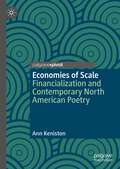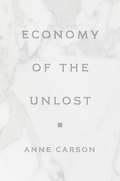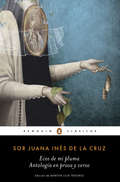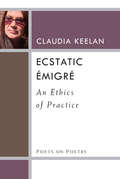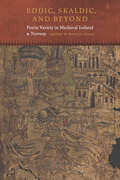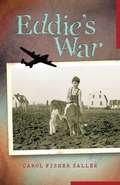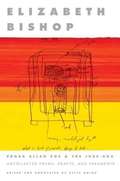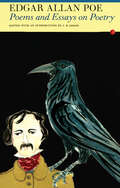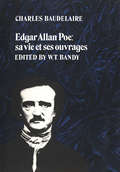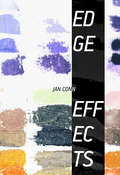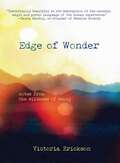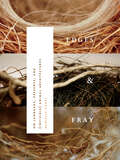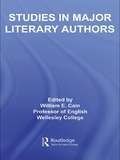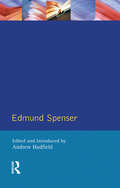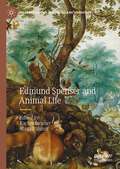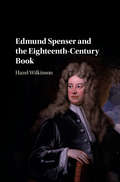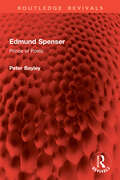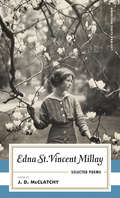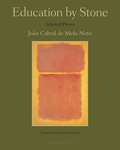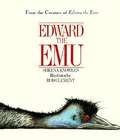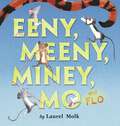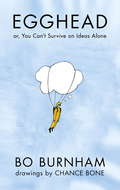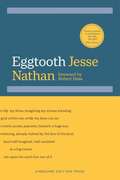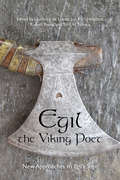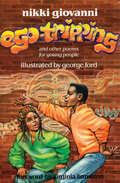- Table View
- List View
Economies of Scale: Financialization and Contemporary North American Poetry (Palgrave Studies in Literature, Culture and Economics)
by Ann KenistonThis book offers the first sustained study of the ways 21st century North American poems engage with financialization. It argues that recent poems about economics not only discuss but enact concerns with containment and agency essential to the contemporary financialized economy by manipulating the seemingly old-fashioned figures of synecdoche (the representation of the whole by the part) and prosopopeia or personification. Its four body chapters offer in-depth readings of the work of eleven formally, culturally, and thematically diverse contemporary U.S. and Canadian poets who variously consider labor, consumerism, debt, and the derivative form; the Coda reads several recent poems about reparations in terms of an emerging tendency to emphasize the historical, racialized, and ethical contexts of contemporary economics. As the book explores financialization’s representation in recent poetry, it redresses arguments that poetry is irrelevant to contemporary culture.
Economy of the Unlost: (Reading Simonides of Keos with Paul Celan) (Martin Classical Lectures #14)
by Anne CarsonThe ancient Greek lyric poet Simonides of Keos was the first poet in the Western tradition to take money for poetic composition. From this starting point, Anne Carson launches an exploration, poetic in its own right, of the idea of poetic economy. She offers a reading of certain of Simonides' texts and aligns these with writings of the modern Romanian poet Paul Celan, a Jew and survivor of the Holocaust, whose "economies" of language are notorious. Asking such questions as, What is lost when words are wasted? and Who profits when words are saved? Carson reveals the two poets' striking commonalities. In Carson's view Simonides and Celan share a similar mentality or disposition toward the world, language and the work of the poet. Economy of the Unlost begins by showing how each of the two poets stands in a state of alienation between two worlds. In Simonides' case, the gift economy of fifth-century b.c. Greece was giving way to one based on money and commodities, while Celan's life spanned pre- and post-Holocaust worlds, and he himself, writing in German, became estranged from his native language. Carson goes on to consider various aspects of the two poets' techniques for coming to grips with the invisible through the visible world. A focus on the genre of the epitaph grants insights into the kinds of exchange the poets envision between the living and the dead. Assessing the impact on Simonidean composition of the material fact of inscription on stone, Carson suggests that a need for brevity influenced the exactitude and clarity of Simonides' style, and proposes a comparison with Celan's interest in the "negative design" of printmaking: both poets, though in different ways, employ a kind of negative image making, cutting away all that is superfluous. This book's juxtaposition of the two poets illuminates their differences--Simonides' fundamental faith in the power of the word, Celan's ultimate despair--as well as their similarities; it provides fertile ground for the virtuosic interplay of Carson's scholarship and her poetic sensibility.
Ecos de mi pluma: Antología en prosa y verso
by Sor Juana de la Cruz«Pero valor, corazón: porque en tan dulce tormento, en medio de cualquier suerte no dejar de amar protesto» Sor Juana Inés de la Cruz es una de las poetas más importantes de la lengua española. Cierra con broche de oro el Barroco hispánico y es, además, una figura muy seductora: mujer, monja, sabia, defensora de la capacidad intelectual de las mujeres. Sin embargo, como todo autor célebre, sor Juana ha sido víctima de su fama: todo mundo la conoce, pero muy pocos la leen. Esta antología presenta una selección representativa de su obra, cuidadosamente puntuada y anotada, para acercarla a cualquier tipo de lector. Como novedad se incluyen, por primera vez juntas, la Carta de sor Juana a su confesor, el padre Núñez, y la Respuesta a sor Filotea de la Cruz, dirigida al obispo de Puebla, atinadamente comentadas por la editora: Martha Lilia Tenorio, especialista en poesía barroca, dedicada a recuperar buena parte del acervo lírico de Nueva España. Edición, prólogo, notas y cronología de MARTHA LILIA TENORIO.
Ecstatic Émigré: An Ethics of Practice
by Claudia KeelanMost think of an émigré as one who leaves her native land to find home in another. Claudia Keelan, in essays both personal and critical, enlists poetic company for her journey, engaging both canonical and common figures, from Gertrude Stein to a prophetic Las Vegas cab driver named Caesar. Mapping her own peripatetic evolution in poetry and her nomadic life, she also engages with Christian and Buddhist doctrines on the virtues of dispossession. ? Ecstatic Émigré pays homage to poets from Thoreau and Whitman to Alice Notley, all of whom share a commitment to living and writing in the moment. Keelan asks the same questions about the growth of flowers or the meaning of bioluminescence as she does about the poetics of John Cage or George Oppen. Her originality is grounded by the ways in which she connects poetic principles with the spiritual concepts of via negativa demonstrated both in St. John of the Cross and Mahayana Buddhism. In addition, her essays demonstrate an activist spirit and share a commitment to the passive resistance demonstrated in Martin Luther King, Jr.’s concept of the “beloved community” and philosopher Simone Weil’s dedication to “exile.”
Eddic, Skaldic, and Beyond: Poetic Variety in Medieval Iceland and Norway (Fordham Series in Medieval Studies)
by Martin ChaseEddic, Skaldic, and Beyond shines light on traditional divisions of Old Norse–Icelandic poetry and awakens the reader to work that blurs these boundaries. Many of the texts and topics taken up in these enlightening essays have been difficult to categorize and have consequently been overlooked or undervalued. The boundaries between genres (Eddic and Skaldic), periods (Viking Age, medieval, early modern), or cultures (Icelandic, Scandinavian, English, Continental) may not have been as sharp in the eyes and ears of contemporary authors and audiences as they are in our own. When questions of classification are allowed to fade into the background, at least temporarily, the poetry can be appreciated on its own terms. Some of the essays in this collection present new material, while others challenge long-held assumptions. They reflect the idea that poetry with “medieval” characteristics continued to be produced in Iceland well past the fifteenth century, and even beyond the Protestant Reformation in Iceland (1550). This superb volume, rich in up-to-date scholarship, makes little-known material accessible to a wide audience.
Eddie's War
by Carol SallerWorld War II. Hitler is threatening to take over the world. Eddie Carl thinks America should stop him—it’s just plain right. But Eddie’s just a kid, and the farm in Ellisville, Illinois, is a long way from the fighting. <P><P>Ellisville: where the big news stories are gophers in the graveyard and the new bank alarm. But then America joins the war and Eddie’s brother Thomas goes off to fly a bomber. Suddenly the war doesn’t seem so far away. And Eddie faces more grown-up problems at home: A fire at the Strothers’ place, and his gypsy friend accused of arson. Grampa Rob, all stubborn and mean. Grama Lucy with her secrets. And that redhead Sarah, who definitely likes him—unless maybe she hates him. Somehow Eddie’s in the middle of it all, trying to figure out what’s right. Let Thomas fight World War II. Eddie’s war is right here in Ellisville. <P><P>Eddie’s War is a lyrical collection of prose vignettes linking Eddie, his family, and a small-town cast of Ellisvillians. Poignant and funny, this World War II story tells how a distant war affects the life of one boy in the Heartland.
Edgar Allan Poe and the Juke-box: Uncollected Poems, Drafts, and Fragments
by Elizabeth BishopFrom the mid-1930s to 1978 Elizabeth Bishop published some eighty poems and thirty translations. Yet her notebooks reveal that she embarked upon many more compositions, some existing in only fragmentary form and some embodied in extensive drafts. Edgar Allen Poe & The Juke-Box presents, alongside facsimiles of many notebook pages from which they are drawn, poems Bishop began soon after college, reflecting her passion for Elizabethan verse and surrealist technique; love poems and dream fragments from the 1940s; poems about her Canadian childhood; and many other works that heretofore have been quoted almost exclusively in biographical and critical studies. This revelatory and moving selection brings us into the poet's laboratory, showing us the initial provocative images that moved her to begin a poem, illustrating terrain unexplored in the work published during her lifetime. Editor Alice Quinn has also mined the Bishop archives for rich tangential material that illuminates the poet's sources and intentions.
Edgar Allan Poe: Selected Poems and Essays
by Edgar Allan PoeHis reputation has never settled, seeing as many reversals after his death as during his life. Though read and enjoyed ny many, fewer admire him openly. This volume includes all of his poetry and his most important essays.
Edgar Allan Poe: sa vie et ses ouvrages
by Charles Baudelaire W. T. BandyThe earliest foreign study of the life and works of Edgar Allan Poe, the text presented in this volume is something of a landmark in the history of comparative literature. Baudelaire's first and longest essay on Poe was published in the Revue de Paris is 1852; it was revised and abridged for use as the preface of the first volume of his translation of Poe's tales, Histoires extraordinaires. This study was significant especially in the area of Franco-American literary relations because it was the basis of not only the French attitude toward Poe, but of his reputation throughout Europe--one might almost say, throughout the world. The essay on Poe has never been the subject of a separate publication. This edition reveals for the first time the sources of information used by Baudelaire. It shows that a considerable part of the study was translated literally from articles by John M. Daniel and John R. Thompson in the Southern Literary Messenger (1849-50). Previous editions vary widely in excellence because almost all suffered from the mistaken belief that Baudelaire was acquainted with the American edition of Poe's works when he wrote the 1852 essay and that it was largely based on Rufus Griswold's Memoir contained in that edition. This led to the commentary and notes that were unconsciously misleading and in many cases false.The introduction to this edition presents a complete and accurate account of the genesis of Baudelaire's essay, with supporting documents showing his indebtedness to American, French, and British sources. It enables the reader to distinguish clearly between what Baudelaire himself knew or thought about Poe and what he borrowed from other writers.
Edge Effects
by Jan ConnReading Edge Effects, Jan Conn’s masterful eighth collection, is a little like looking at Edward Burtynsky’s photographs of real industrial wastelands; both visions are as gorgeous as they are terrifying, platforms for thought, even for activism, depending as they do on the energy of the viewer/reader for completion.
Edge of Wonder: Notes from the Wildness of Being
by Victoria EricksonIn this remarkably beautiful collection of poems and musings, Victoria Erickson calls us to the core of our own aliveness with an ongoing invitation to inhabit a life fiercely lived. Artfully weaving words like a vivid tapestry, she gently reaches into the soul and invites us to swim in an ocean of hope, continuously choosing love and everyday magic over fear and resistance. Equal parts old soul and starry eyed child, Erickson encourages us to find the depth and meaning within our lives, reminding us to stay true to our own paths, while embracing both the pain and the beauty at the heart of reality.Hold this book close as a timeless reminder that wonder is everywhere. Your daily cup of universe.
Edges & Fray: on language, presence, and (invisible) animal architectures (Wesleyan Poetry Ser.)
by Danielle VogelPoetry, prose, and photographs, explore the edges of languageEdges & Fray is an embodied meditation that cultivates receptivity and deep listening to the ways we inhabit language and its ethereal resilience. Combining close observation of birds' nests and the writing process, Danielle Vogel brings the reader into communion with language as a mode of presence. The frayed edges of consciousness are carefully arranged to suggest how writing, and the book, can serve as a site of radical transformation. Experimental and deeply grounded, this work is lyrical and patient. The text creates overlapping ecological fields, wherein each field is a system always in a state of becoming. Finding its strength in fragility, Edges & Fray is personal without feeling private, experimental without feeling programmatic. Its construction is intuitive and masterful, its many threads interwoven and intrinsically linked. This is a beautiful and inspiring book at the intersection of poetry, somatics, ecology, and divination.
Editing Emily Dickinson: The Production of an Author (Studies in Major Literary Authors)
by Lena ChristensenEditing Emily Dickinson considers the processes through which Dickinson's work has been edited in the twentieth century and how such editorial processes contribute specifically to the production of Emily Dickinson as author. The posthumous editing of her handwritten manuscripts into the conventions of the book and the electronic archive has been informed by editors' assumptions about the literary work; at stake is fundamentally what a Dickinson poem may be, or, rather, how we may approach such an object.
Edmund Spenser (Longman Critical Readers)
by Andrew HadfieldThis collection represents some of the best recent critical writing on Edmund Spenser, a major Renaissance English poet. The essays cover the whole of Spensers work, from early literary experiments such as The Shepeardes Calendar, to his unfinished crowning work,The Fairie Queene. The introduction provides an overview of critical responses to Spenser, setting his work and the debates which it has generated in their perspective contexts: new historicist, post-structural, psychoanalytic and feminist. His study also covers the critical responses of leading British, Irish and American scholars.
Edmund Spenser and Animal Life (Palgrave Studies in Animals and Literature)
by Abigail Shinn Rachel StennerThis book is the first extended critical study of the early modern poet Edmund Spenser from the perspective of animal studies. With an introduction situating Spenser in current discussions of animal life and literary form, and early modern animal studies, the book proceeds in four sections: “Animals and Cultural Practices”; “Animals, Slavery, and Race”; “Animals in Complaints”; “Readers and Poetics in The Faerie Queene”. Contributors discuss a broad range of Spenser’s work, putting it into dialogue with a number of early modern discourses, including politics, poetics, and natural history.
Edmund Spenser and the Eighteenth-Century Book
by Hazel WilkinsonEdmund Spenser's epic poem The Faerie Queene (1590-96) occupied an important place in eighteenth-century culture. Spenser influenced almost every major writer of the century, from Alexander Pope to William Wordsworth. What was it like to read Spenser in the eighteenth century? Who made Spenserian books, and how did their owners use and interpret them? The first comprehensive study of all of the eighteenth-century editions of Edmund Spenser addresses these questions through bibliographical analysis, and through examination of the history of the book and of eighteenth-century literature and culture. Within these contexts, Hazel Wilkinson provides new information about the production, contents, texts, and reception of the eighteenth-century editions of Spenser, to illuminate how his cultural presence became so far-reaching. With each chapter structured around a major edition of Spenser's work, this volume provides a timely addition to arguments about the nature of literary history and the growing cult of great writers of the past.
Edmund Spenser: Prince of Poets (Routledge Revivals)
by Peter BayleyFirst published in 1971, Edmund Spenser presents a comprehensive overview of Spencer's work, including the minor poems and the prose View of Ireland. There are chapters on the Shepheardes Calendar, the Complaints poems, the great love and religious poetry of 1595-6 and The Faerie Queene. The author illustrates the range of Spencer's imaginative and poetic skills in pastoral, elegy, lyric, satire, sonnet, ode, epithalamium, religious ode and epic, and shows why he was the most popular of Elizabethan poets. This is a must read for scholars of English literature in English poetry.
Edna St. Vincent Millay: Selected Poems
by J. D. McClatchy Edna St. MillayThe Selected Poetry of Edna St. Vincent Millay is a collection of some of her most loved poems. Brought together in this volume are the individual works of Renascence and Other Poems, A Few Figs From Thistles, Second April, and The Ballad of the Harp-Weaver.
Education by Stone
by Joao Cabral de Melo Neto Richard ZenithImagine making poems the way an architect designs buildings or an engineer builds bridges. Such was the ambition of João Cabral de Melo Neto. Though a great admirer of the thing-rich poetries of Francis Ponge and of Marianne Moore, what interested him even more, as he remarked in his acceptance speech for the 1992 Neustadt International Prize for Literature, was "the exploration of the materiality of words," the "rigorous construction of (. . .) lucid objects of language." His poetry, hard as stone and light as air, is like no other.
Edward The Emu
by Sheena KnowlesEdward the emu was sick of the zoo, There was nowhere to go, there was nothing to do, And compared to the seals that lived right next door, Well being an emu was frankly a bore. Tired of his life as an emu, Edward decides to try being something else for a change. He tries swimming with the seals. He spends a day lounging with the lions. He even does a stint slithering with the snakes. But Edward soon discovers that being an emu may be the best thing after all. And so he returns to his pen, only to find a big surprise awaiting him. . . . Edward is tired of being an emu, so he decides to try being something else for a change. First he spends some time swimming with the seals. Next, he lounges with the lions. He even slithers with the snakes. But Edward soon discovers that being an emu may not be so bad after all. So he heads back to his pen, only to find a big surprise awaiting him . . . Sheena Knowles' upbeat, rhyming text and Rod Clement's deliciously droll illustrations are sure to make readers laugh out loud in this whimsical picture book by the creators of Edwina the Emu. "If you buy one book. . . for sheer fun, there's no question it should be this one. " San Diego Union Tribune
Eeny, Meeny, Miney, Mo, and FLO!
by Laurel MolkThe mission: catch a tiger by the toe.The team: brothers Eeny, Meeny, Miney,and Mo. But what about little sister Flo? Can’t she help, too?Join these mischievous mice for a rollicking twist on a familiar nursery rhyme.Just be sure to watch your toes!
Egghead: Or, You Can't Survive On Ideas Alone
by Bo BurnhamIn 2006, at the age of 16, Bo Burnham posted videos he’d made of himself performing two songs about teenage angst on YouTube for his brother to watch. From this modest start, his YouTube videos with their unique blend of stand-up and music, now receive millions of views.
Eggtooth
by Jesse NathanIn this debut collection, Jesse Nathan matches an exquisite feeling for the music of lines and sentences with his profound explorations of the idea of home. The book's title comes from the word for a bit of cartilage on a baby bird's beak, a growth that helps it break out of the egg. Shortly after the bird hatches, the tooth disappears. Like an eggtooth, Nathan's poems are often figures for birth, for the violence of birth and, in his case, rebirth. They follow an unusual and passionate boy from his childhood on a wheat farm in the watershed of the Running Turkey Creek in rural southcentral Kansas ― "the land was always the solace" ― to his life years later in a coastal city.
Egil, the Viking Poet
by Russell Poole Laurence De Looze Jon Karl Helgason Torfi H. TuliniusEgil, the Viking Poet focuses on one of the best-known Icelandic sagas, that of the extraordinary hero Egil Skallagrimsson. Descended from a lineage of trolls, shape-shifters, and warriors, Egil's transformation from a precocious and murderous child into a raider, mercenary, litigant, landholder, and poet epitomizes the many facets of Viking legend.The contributors to this collection of essays approach Egil's story from a variety of perspectives, including psychology, philology, network theory, social history, and literary theory. Strikingly original, their essays will appeal not only to dedicated students of Old Norse-Icelandic literature but also to those working in the fields of Viking studies, comparative ethnology, and folklore.
Ego-Tripping and Other Poems for Young People
by Virginia Hamilton Nikki Giovanni George FordInsightful and fun, this collection of poetry captures the essence of the African American experience for young people.
